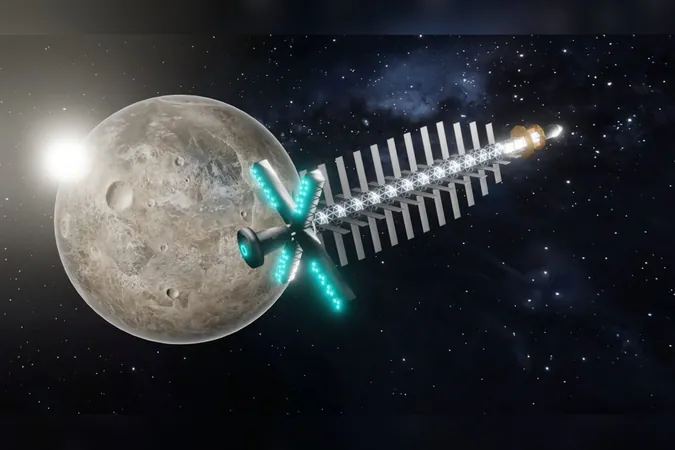
Groundbreaking Nuclear-Powered Spacecraft Project to Revolutionize Space Exploration by the 2030s
2024-11-19
Author: Arjun
Groundbreaking Nuclear-Powered Spacecraft Project
A consortium of pioneering companies has embarked on an ambitious 11-year initiative that could pave the way for the first-ever nuclear-powered space tug. This innovative project, dubbed RocketRoll, aims to revolutionize how space agencies approach propulsion systems, establishing a roadmap for long-duration missions fueled by nuclear energy.
Development of Technology Demonstrator
Following the completion of its initial phase, RocketRoll sets the stage for developing a technology demonstrator—an experimental spacecraft designed to test and showcase the potential of nuclear propulsion. This milestone is crucial as it could soon transition nuclear-powered spacecraft from a theoretical concept to practical application, becoming the go-to choice for future space missions.
Limitations of Traditional Rocket Fuels
The traditional rocket fuels have their advantages, yet they also pose significant limitations. Once the fuel is depleted, a spacecraft is rendered helpless, subjected solely to gravitational forces and the inhospitable vacuum of space. According to the European Space Agency (ESA), "Nuclear propulsion can be multiple times more efficient than the most efficient chemical propulsion, or exceed the electric power limited by solar energy, thus enabling exploration where no other technology can go."
Addressing Fuel Scarcity in Space
To address the challenges of fuel scarcity in space, agencies are actively developing power-generating systems, including solar sails and nuclear reactors. RocketRoll focuses on creating a Nuclear Electric Propulsion (NEP) system, expected to be operational by 2035. This spacecraft will help identify the necessary technologies and improvements needed before a more extensive mission can be executed.
Exploring Advantages of NEP System
The ESA noted that RocketRoll "will explore the advantages of using an NEP tug over traditional propulsion systems for the demanding missions expected for the future of space logistics and exploration." This advanced propulsion system could significantly contribute to lunar and Martian exploration, powering habitats and robotic missions across the solar system.
Commitment to Engineering Nuclear Power Solutions
The consortium behind RocketRoll, including Tractebel, is committed to engineering a variety of nuclear power solutions, ranging from radioisotope systems to advanced fission technologies. However, concrete decisions regarding the generation of nuclear power onboard the demonstrator remain to be made, with nuclear fission currently favored among the propulsion systems under development.
Distinction Between Fission and Fusion
Nuclear fission, the core process used in modern nuclear reactors, is distinct from nuclear fusion, which powers the stars. While fusion promises greater energy output and less waste, it remains an elusive goal in the realm of practical energy generation. Despite controversies surrounding nuclear energy, it has supplied about 20% of the United States' power since 1990, underscoring its potential in a future dominated by clean energy.
Recent Advancements in Nuclear Propulsion Technology
2023 saw considerable advancements in nuclear propulsion technology, including a $33.7 million contract from the Pentagon to Lockheed Martin aimed at developing these technologies under the Joint Emergent Technology Supplying On-Orbit Nuclear (JETSON) program. Additionally, NASA and DARPA enlisted Lockheed Martin to assist in creating DRACO (Demonstration Rocket for Agile Cislunar Operations), a project leveraging fission energy. Rolls Royce also made strides in developing a nuclear engine prototype this year.
Future Prospects for Nuclear Propulsion
NASA's Innovative Advanced Concepts (NIAC) program has recently selected a cutting-edge pulsed plasma rocket powered by fission energy as one of its promising mission concepts, highlighting the growing enthusiasm for nuclear propulsion in space exploration.
Conclusion
The RocketRoll initiative is more than just a project; it's a significant leap towards transforming how humanity navigates the cosmos, potentially opening doors to depths of outer space we've yet to explore. With a nuclear-powered future on the horizon, the universe may soon be more accessible than ever before!



 Brasil (PT)
Brasil (PT)
 Canada (EN)
Canada (EN)
 Chile (ES)
Chile (ES)
 España (ES)
España (ES)
 France (FR)
France (FR)
 Hong Kong (EN)
Hong Kong (EN)
 Italia (IT)
Italia (IT)
 日本 (JA)
日本 (JA)
 Magyarország (HU)
Magyarország (HU)
 Norge (NO)
Norge (NO)
 Polska (PL)
Polska (PL)
 Schweiz (DE)
Schweiz (DE)
 Singapore (EN)
Singapore (EN)
 Sverige (SV)
Sverige (SV)
 Suomi (FI)
Suomi (FI)
 Türkiye (TR)
Türkiye (TR)